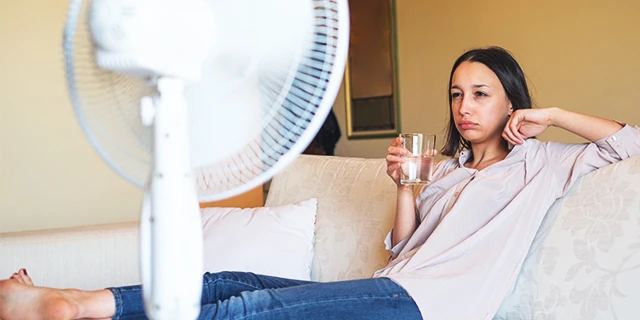Looking for ways to beat the summer heat? Our president and CEO Mike Bidwell shared the following advice with The Weather Channel. Here are some tips to stay cool and save money during a heatwave, courtesy of Neighborly!
Neighborly is a community of home service experts. As locally owned and operated franchises, we are united by quality and service standards that make us one of the most trusted providers for home improvement, repair, and maintenance.

Tip #1: Manage Your Air Flow
- Installing ceiling fans could cut costs by as much as 40 percent in the summer! Make sure your ceiling fan is switched to “counterclockwise” rotation in the summer months so that air is forced down instead of up toward the ceiling.
- Change your HVAC system air filter every three months or sooner. Dirty air filters reduce airflow and inhibit your HVAC system’s ability to effectively cool your home. Make sure the filter is the proper fit for the system and filter efficiency for your family’s needs.
- Dust, debris, and other blockages can build up over time, restricting the airflow through your HVAC system ducts. Have your ducts cleaned every three years so your AC unit works more efficiently.
Tip # 2: Take Control of Your Thermostat
- Set your thermostat to no lower than 78 degrees during the summertime. According to Energy Star, you can save you 12 percent compared to setting your thermostat to 74 degrees Fahrenheit.
- Consider installing a programmable thermostat. Just increasing your thermostat eight degrees while you're at work or sleeping can save an average of $180 each year.
- Refrain from placing lamps or heat-generating appliances near your thermostat. The thermostat will not be able to accurately determine the room temperature and may not run as efficiently.
- Run exhaust fans in the kitchen, bathroom, and laundry room to minimize indoor humidity and avoid that “hot and sticky” feeling.
Tip #3: Invest in Energy-Efficient Upgrades
- Swap your incandescent light bulbs for cooler, more efficient alternatives like CFLs or LEDs. Incandescent bulbs give off 90 percent of their energy as heat - every little bit counts!
- Install dimmer switches to reduce wattage used, which helps lower your energy bill. Also, be sure to turn off lights when not in use.
- Install an attic ventilator fan to let heat escape. Attics can reach more than 150 degrees in the summer! Ventilator fans push out hot air and draw in cooler air, reducing strain on your home’s AC system.
- If your air conditioner is eight or more years old, consider a replacement. A new system is an investment that will help you save on your energy bills and reduce the need for expensive, repeated repairs.
- Enlist a professional to clean your dirty condenser (outside AC unit) to allow greater airflow and distribution across the coil. A service technician will also oil the motors and check the refrigerant charge and electrical components for safety hazards.
Tip #4: Deck Out Your Windows & Doors
- According to the U.S. Department of Energy, solar heat gain through windows accounts for up to one-third of the cooling costs in your home. Place reflective film on windows to reduce the sun’s harmful rays and block 99 percent of ultraviolet rays. This film still allows 100 percent visibility.
- Install shades and drapes and keep them closed during the day.
- Create your own shade by adding awnings over the windows.
- Install double-pane windows with low-E coatings to keep hot air out. Double pane windows work with your air conditioning, not against it, to ensure you’re getting your money’s worth!
- Does your front door face the west during the day’s hottest hours? Consider adding glazing and coatings to protect the interior from UV rays on a door’s glass, either on the door, above, or to the side. This also helps resist break-ins and muffle sounds.
- Consider switching to steel and fiberglass doors over wood doors. They offer superior energy efficiency - having double-paned glass aids in these efforts!
- Keep direct sunlight at bay during the summer with strategically planted trees for natural shade.
Tip #5: Seal the Leaks
- Check for air leaks around doors and windows by holding a candle near these areas. If the flame moves, you’ve detected a leak.
- Add weather stripping around windows and doors to prevent drafts and reduce heat loss.
- Check that the handles on your windows are in the locked position to ensure they are closed and sealed. Unlocked windows allow a small gap and energy loss.
Other Ways to Conserve Energy Any Time of Year
- Run heat-generating appliances (dishwasher, stove, etc.) when the sun goes down. In addition, turn off the heated dry feature on your dishwasher. This small switch saves 10 to 15 percent of the dishwashers’ total energy use.
- Use a smart power strip. Smart power strips cost about $20 and provide surge protection while helping fight “energy vampires” and safeguarding your electronics from power surges and overloads.
- Avoid using appliances during “peak power” times, which vary by season and by the electrical company. Call your provider for up-to-date information so you can use energy-draining appliances during “off-peak” times of the day.
- Wash laundry in cold water. Ninety percent of the energy used to wash your clothes is attributable to water heating. Only 10 percent goes to washer operation.
- Lower the temperature on your tank-style water heater to 120 degrees Fahrenheit for substantial savings. Take shorter showers and turn off your water heater tank while you’re on vacation to save even more!
Need a professional to help you with these tips? Get started by connecting with a local Neighborly home service expert.
Looking for more tips and tricks for your home? Explore our Neighborly Expert Tips page.



 Back
Back
 1 (855) 217-8437
1 (855) 217-8437


